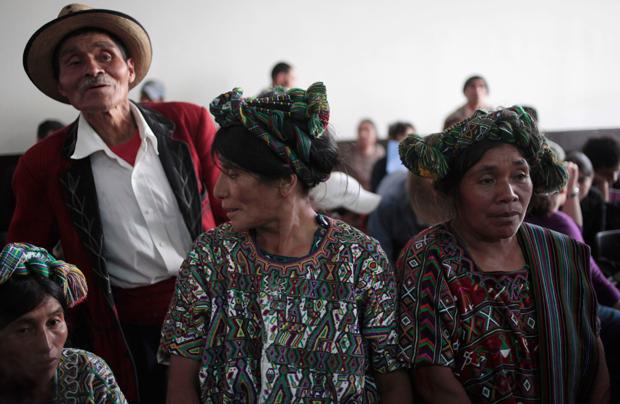Trial of former dictator forces Guatemala to face its turbulent past
Indigenous people attend the trial against the former Guatemalan dictator Rios Montt at the Supreme Court of Justice in Guatemala City. (Photo by Jorge Dan Lopez/Reuters.)
A long-running court trial in Guatemala is examining a part of the nation’s history that many residents would prefer to forget.
Former dictator José Efraín Ríos Montt is on trial for war crimes allegedly committed under his rule in the 1980s, including the slaughtering of thousands of Guatemalan Indians.
Prosecutors filed the charges against Ríos Montt in January, more than three decades after he seized power through a military coup in March 1982. The trial is expected to last at least a year.
Guatemala’s civil war between government and rebel forces lasted 36 years. Ríos Montt’s 17 months in power were among the most brutal.
A U.N. Truth Commission found that nearly half of the war’s human rights abuses occurred in 1982. He was never held responsible, despite his bluntness about the violence.
“We are going to kill,” he said during an interview in 1982. “But we are not going to assassinate.”
The war finally ended in 1996, but by then Ríos Montt had been elected to the Guatemalan Congress. He enjoyed congressional immunity from prosecution until January, when he resigned from Congress at the age of 85. Prosecutors pounced and he is now under house arrest.
Prosecutors in a Guatemala City court contend that Ríos Montt’s troops carried out a brutal campaign of massacres in northern Guatemala designed to eliminate the region’s Mayan-Ixil Indians. Army officers accused the Indians of harboring Marxist guerrillas. Survivors say the campaign was ruthless; women were raped, children were killed and entire families were wiped out.
Edwin Calil, a survivor attending the trial, said troops burst into his village looking for rebels and executed nine members of his family when he was six years old.
“They killed my grandmother, my mother, four sisters and three cousins,” he said.
Danilo Rodriguez, the lead defense attorney, said his client is not guilty of genocide and that Ríos Montt’s troops were bent on destroying guerrillas, not an entire ethnic group.
“Atrocities were committed,” Rodriguez said. “But they don’t add up to genocide.”
There were so many alleged atrocities that when Ríos Montt was formally charged in January it took the judge three hours to read them all. Yet few Guatemalans were paying much attention.
Jose Leiva, a 27-year-old greeting cards seller at the downtown central market in Guatemala City, grew up after Ríos Montt’s de facto presidency and his scorched-earth campaign. He said he knew almost nothing about the former dictator.
At his high school, Leiva said teachers focused on tamer subjects such as Guatemala’s mountains and volcanoes. They provided little information about the war.
The Ríos Montt trial is a high-profile effort to examine that past. Yet the army still defends the scorched-earth tactics of the 1980s as a necessary evil. And it still wields vast influence. President Otto Perez is a former general who served under Ríos Montt.
Beyond the courtroom, one of the few places in Guatemala City where the war’s atrocities are on vivid display is at the Foundation for Forensic Anthropologists, a group that excavates mass graves.
“I don’t know if we can define it as a museum,” said foundation member Isaac Rodriguez. “It is more like an effort for the memory, so the people don’t forget what happened in this country.”
Rodriguez pointed to a wall decorated with military documents from the early 1980s that reveal the fate of political prisoners and read “Manuel Alfredo Molina, 300. Otto Leonel Juarez, 300.” He explained that the 300 after each name is a military code, which means that the prisoner was secretly executed.
“You can see how big and powerful [was] the killing machine,” he said.
A few blocks from the museum is the National Cathedral. The names of thousands of people engraved on the stone pillars outside the church are another reminder of Ríos Montt’s rule.
